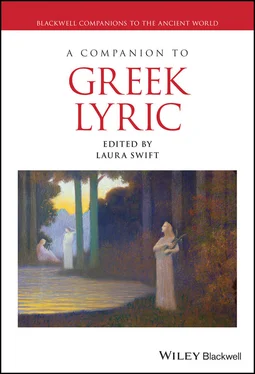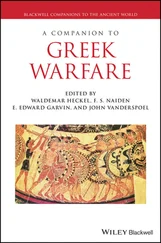In contrast, in the Sixth Olympian , an epinician for the Syracusan Hagesias, Pindar mentions Aeneas, a chorodidaskalos whom he compliments for his skills (87–91):
Now, Aeneas, urge your companions first to celebrate Hera the Maiden, and then to know if by our truthful words we escape the age-old taunt of “Boeotian pig,” for you are a true messenger, a message stick of the fair-haired Muses, a sweet mixing bowl of loudly ringing songs.
Space considerations do not allow a detailed account of several important issues raised by Pindar’s request to Aeneas, so I shall limit myself to the ancient scholiasts’ explanation:
For this Aeneas was the chorodidaskalos , whom Pindar used because he was weak-voiced and could not lead the choruses by himself in public, which most of the poets and especially those who had strong voices used to do when they participated in contests, teaching the choruses themselves. ( Σ ad Olymp . 6. 148a) 35
The scholiasts had no way to know if Pindar was weak-voiced nor do they cite their authority. They probably deduced this conclusion from Pindar’s compliment to Aeneas that he is a “mixing bowl of loud ringing songs” (γλυκὺς κρατὴρ ἀγαφθέγκτων ἀοιδᾶν). If there was any grain of truth in this contention, we would expect Pindar to address the chorodidaskaloi he used more often. As it happens, the request is extremely rare, if not unique. 36Besides, it is hard to believe that Pindar would have such success in the dithyrambic contests in Athens if he was unable to teach choruses. Delegation of chorodidaskalia must have been common practice for poets of Panhellenic stature. Poets in high demand must have traveled a lot, but even so it would be impossible to train all choruses in all cities which had commissioned song-dances.
Pindar must have trusted Aeneas whom he praises for being a faithful messenger, a message stick of the lovely-haired Muses. Turned on its head Pindar’s compliment reveals the anxiety that poets must have felt when they sent their songs to be performed under the supervision of people they did not know. This is why it is hard to imagine that poets like Pindar and Simonides would risk competition by proxy in prestigious contests. Simonides’ decision to train the Antiochid tribe at an advanced age shows that he was not prepared to delegate this task to somebody else and risk his success at a prestigious contest. 37
Our evidence shows that more often than not the roles of chorodidaskalos and chorus leader ( choragos ) were distinct. In Athens, for instance, in the dithyrambic and dramatic contests the chorus leader was called the coryphaeus , whereas the term chorēgos was used of the producer of the show. 38Beyond Athens our evidence is scant. In Alcman’s Louvre partheneion the chorus leader is Hagesichora. In all likelihood she, her second in command Agido, and the other members of the parthenaic chorus were trained by Alcman. In the archaic period choral instruction had a pedagogical dimension that went far beyond preparation for a certain performance. 39The pedagogical dimension of choreia was later succinctly formulated by Plato’s: ὁ … ἀπαίδευτος ἀχόρευτος, “the uneducated man is one without choral training,” ( Laws 654a).
Was Pindar the chorodidaskalos of the fragment 94b, the partheneion he composed for the Theban festival of Daphnephoria? The leader of the procession, which can be reconstructed to some extent thanks to Proclus’ testimony, was probably the boy Agasicles, the daphnēphoros , escorted by his father Pagondas. The chorus leader was female, perhaps Damaena, Pagondas’ daughter, according to Luigi Lehnus’ widely accepted reconstruction. 40Another female, Andaisistrota, is said to have trained either the chorus leader or some other female choreut (66–75):
Δαμαίνας π̣α[. .]ρ̣ . . […]ωι νῦν μοι ποδὶ
στείχων ἁγ̣έο·̣ […] [τ]ὶ̣ν γὰρ̣ ε̣[ὔ]φρων ἕ̣ψεται
πρώτα θυγάτηρ [ὁ]δοῦ
δάφνας εὐπετάλου σχεδ[ό]ν
βαίνοισα πεδίλο̣ις,
Ἀνδαισιστρότα ἃν ἐπά-
σκησ̣ε μήδεσ[ι.] . [.]τ̣[.]. . []
ἁ δ’ ἔρ[γμ]ασι̣ [– –
μυρίων ε[… … … .]α̣ις
ζευξα[υ υ–
of Damaena, stepping forth now with a … foot, lead the way for me, since the first to follow you on the way will be your kindly daughter, who beside the branch of leafy bay walks on sandals, whom Andaisistrota has trained in skills … and she, with works of innumerable and ( . . . ) having yoked. 41
The text is too lacunose to allow certainty concerning the kind of training Andaisistrota offered, but the participle ζευξα[ (perhaps yoking the chariot of song?) as well as the immediate and broader context points to music and poetry. Before the text breaks off in another self-referential statement the chorus mentions nectar (μὴ νῦν νέκτα[ρ … … …]νας ἐ̣μᾶς, 76). Whatever the familial relations between the choreuts’ relations were, it looks as if Pindar offered a glimpse into choral education of young Theban girls by female teachers. The choreuts of Alcman’s Louvre partheneion mention a certain Aenesimbrota who could also have been a chorodidaskalos , but the diction is far more vague than in the Pindaric daphnēphorikon . 42
What Alcman’s Louvre partheneion and Pindar’s daphnēphorikon have in common is the gender of the choreuts, for the occasions for which they were composed and consequently their contents are very different. Claude Calame’s reconstruction of the occasion of Alcman’s partheneion has stood the test of time despite challenges to it, i.e., a ritual celebration in song and dance of the transition of the choreuts to female maturity. Pindar’s partheneion , on the other hand, honors Apollo and the members of a prominent family whose male members are praised for their athletic victories, the care they take of foreigners ( proxenia ), and their devotion to justice (38–65), whereas the female members, some of which are taking part in the song-dance, are praised for their musical gifts. 43
It is worth noting, however, that despite their different circumstances both choruses compare their singing to the enchanting singing of the Sirens. In Alcman’s partheneion it is Hagesichora who is compared with the Sirens (96–97). The text is frustratingly lacunose, but in what survives the chorus seem to say that Hagesichora cannot sing better than the Sirens, because they are goddesses, but she can sing as well as a mortal can. In the daphnēphorikon the Theban choreuts assert that with the accompaniment of auloi made of lotus they will imitate with their songs the Sirens’ boast (σειρῆ̣να δὲ κόμπον αὐλίσκ̣ων ὑπὸ λωτίνων μιμήσομ̣’ ἀοιδαῖς, 13–15) whose power is such that it silences the swift blasts of the West wind (Zephyrus) and “whenever with the strength of winter chilling Boreas rages swiftly over the sea … stirs up the blast …” (trans. Race). At this point our text becomes lacunose, but the Hesiodic intertext (fr. 27–28 M.-W) according to which the Sirens enchanted the winds (τοὺς ἀνέμους θέλγειν) indicates a similar boast. Like the song of the Sirens that can conquer the raging North wind, the song that the Theban choreuts are about to reenact in the here and now will prove comparably enchanting. The specification of the material of the auloi as lotus wood intensifies the Odyssean intertext of irresistible enchantment. 44Pindar was well aware of the irresistible power of song. In the Eighth Paean he sang of the wondrous artifact of Hephaestus and Athena, the Kēlēdones , whom the two gods decided to destroy, when they realized the effect their song had on mortals who, unable to resist them and depart, stayed and died in Delphi. 45The Odyssey offered a more viable model of handling enchantment, since Odysseus was able both to enjoy the intense pleasure of the performance of the Sirens and survive it.
Читать дальше












